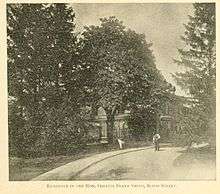Frank Smith (Canadian politician)
| The Hon. Sir Frank Smith | |
|---|---|
 | |
| Senator for Toronto, Ontario | |
|
In office February 2, 1871 – January 1, 1900 | |
| Appointed by | John A. Macdonald |
| Personal details | |
| Born |
March 13, 1822 Richill, Armagh, Ireland |
| Died |
January 17, 1901 (aged 78) Toronto, Ontario |
| Political party | Conservative |
| Cabinet |
Minister Without Portfolio (1882–1891 & 1892–1896) Minister of Public Works (1891–1892) Controller of Customs (Acting) (1896) |
Sir Frank Smith, PC (March 13, 1822 – January 17, 1901) was a Canadian businessman and senator.
He was born in County Armagh in Ireland and in 1832 came to Canada with his family and his father established a farm in Etobicoke. Smith went into commerce, first working as a clerk in several Toronto stores, and then opening is own wholesalers in London, Ontario in 1849. After a few years of limited business, the arrival of the railway in London set off an economic boom and Smith prospered greatly. He expanded his business interests, including becoming the primary shareholder in the Toronto Street Railways.

Smith made his fortune with the streetcar service generating record products by cutting costs, not replacing aged cars and requiring his employees to work 14 hour days, six days a week for $8 to $9 a week. When his workers threatened to join the Knights of Labor trade union he locked them out resulting in three days of violent protests. Mayor William Holmes Howland and the press supported the workers' right to organize but Smith refused to allow a union and criticized the city government for failing to maintain order. In the end, Smith allowed limited pay increases but refused to allow a union and fired the organizers prompting a strike and the establishment of a rival, worker run "Free Bus Company" which was soon out of business when its fleet was destroyed by fire. Smith's actions alienated the Toronto working class, particularly Catholic workers among whom he hoped to build a political base. Smith sold his share of the TSR to the city in 1881 for $500,000.[1]
In 1866, he was elected mayor of London, Ontario.
Originally a supporter of the Reform movement that evolved in the Liberal Party, Sir John A. Macdonald persuaded him to switch his allegiance to the Conservatives and organize support for the Tories among the Irish Catholic community. In 1871, he was appointed to the Canadian Senate as a Liberal-Conservative and served in Sir John A. Macdonald's cabinet from 1882 to 1891 as minister without portfolio. He continued in the cabinet when Sir John Joseph Caldwell Abbott became prime ministare and served as Minister of Public Works, and Controller of Customs (Acting) from 1891 to 1892 following the resignation of Sir Hector-Louis Langevin. Due to age and poor health he declined to continue in cabinet when Sir John Sparrow David Thompson became prime minister in 1892. Following Thompson's death in December 1892, Governor General Lord Aberdeen invited Smith to become prime minister but he declined. He agreed, however, to return to cabinet as a minister without portfolio under Mackenzie Bowell and then Sir Charles Tupper until the Conservatives were defeated in the 1896 federal election.[1]
In politics, Smith was an advocate of the rights of Irish Catholics and lobbied for the appointment of Irish Catholics to patronage positions. In 1872, he lobbied Macdonald for the gradual release of Fenian raiders who had attempted military attacks on Canadian soil in order to promote Irish independence.
Smith was created a Knight Bachelor in June 1894.
See also
References
- Frank Smith (Canadian politician) – Parliament of Canada biography
- Biography at the Dictionary of Canadian Biography Online
- Thompson, Austin Seton. Spadina Story of Old Toronto Pagurian Press, 1975
| ||||||
| ||||||||||||||||||
| ||||||||||||||||||
|